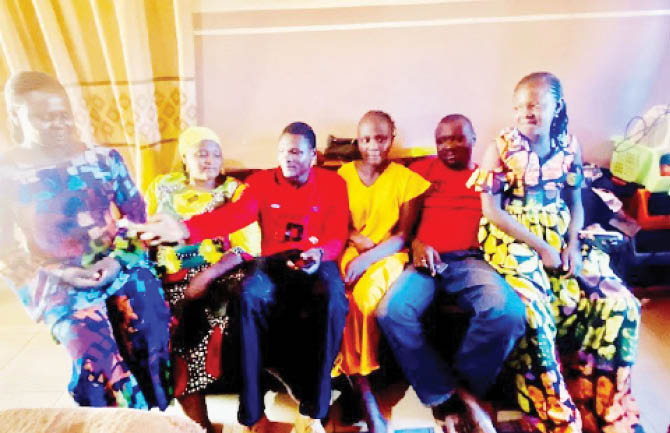Shehu Abubakar and Esther Shehu have been married for 20 years and belong to different religious faiths. While Abubakar is a Muslim his wife, Esther is a Christian. The couple live in Fobur, a community located in the eastern part of Jos East Local Government Area of Plateau State.
Fobur is a farming community that is predominantly inhabited by the Afizere tribe. Here, it is not unusual to find parents and their grown children embracing different religious faiths but each respecting the other’s spiritual path. Siblings and half-siblings from the same household may also practice different faiths but live together in harmony and mutual respect within the same compound.
Therefore, it is not uncommon to find other couples like Shehu Abubakar and Esther Shehu, who come from different religious backgrounds, yet share a love and commitment that serves as a bridge for religious tolerance and co-existence.
The Christmas period, widely regarded as a season of love, gift-giving and family, provides an avenue for strengthening family ties within interfaith families. In Fobur, these family ties transcend religious boundaries, bringing Christian and Muslim relatives together to celebrate in harmony. Through this, the community stands out as a unique example of love, respect and religious tolerance in Plateau State, where the colours of ethno-religious intolerance often cause violence between Christians and Muslims.
- NAFDAC destroys N120bn worth of counterfeit products in 6 months
- Wike tackles Odili over ‘turning Rivers into private estate’ comment

Our correspondent visited the Fobur community on Christmas Day to capture how this year’s Christmas festivity and other shared values are strengthening the bond in interfaith families. According to residents, religious festivities provide an opportunity to foster unity among families, who come together to celebrate in love and share gifts and food with one another.
Esther Shehu, a Christian, who is married to a Muslim said: “My husband goes to the Mosque, but he still buys all the food we prepare for Christmas. He purchases clothes for me and our children, as well as drinks, and even encourages us to share with our neighbours on Christmas Day. He’s very supportive during every Christmas celebration.”
The Shehus’ home in Fobur was beautifully decorated in bright Christmas colours, a reflection, she said, of her husband’s religious tolerance. To cap it up, Esther told this reporter that her husband plays music for the children to dance during Christmas celebrations.
“He does everything for me during this festival and that is why I reciprocate his kindness during Sallah by doing everything he wants. I cook the traditional Sallah food, and celebrate with him. During Sallah, our house is filled with Christian neighbours to celebrate with him,” she said.
On his part, Mr Shehu explained that he loves to join the family in celebration during Christmas as they feast together and share with others. “The celebration was good,” he said, referring to this year’s Christmas adding that “I am happy, I have such a wife because she gives advice and gives words of encouragement. Some people here cherish the way we live. I practice my religion and she practices hers. We have been living peacefully for more than two decades,” he said.
Like the Shehu’s, the Igyem family offers another example of love, respect and mutual tolerance within interfaith families. “We celebrate Christmas with our Muslim siblings and relatives. On Christmas eve, we cook, fry, and share meals together,” said Mary Igyem, a member of an interfaith family in Fobur.
“Though we practice different religions, we are one family,” she said and narrated how her sister-in-law, who is Muslim, assisted her in preparing the variety of food she cooked for the Christmas celebration. “My elder brother is a Muslim and he came to my doorstep to wish me a happy Christmas. On Sallah day, I replicate the same gesture. These are the ways we reconnect and strengthen our bonds to live peacefully with one another,” she said.
Mary’s father and the family patriarch, Igyem Muhammad is a Muslim. He has 10 children divided between the Islamic and Christian faiths. He said they celebrate both Christmas and the Islamic Sallah together, cooking and sharing meals.
“You hardly see segregation amongst us,” he told Daily Trust, “We join the Christians among us to celebrate the Christmas festivity. They bring food to me even though I am a Muslim.”
Halima Agwon, a Christmas celebrant in Fobur explained that despite their religious differences, members of her family share a common compound and therefore celebrate festivities together.
The Agwon family in Fobur exudes unity in an interfaith family where siblings of different faiths coexist harmoniously. “During Christmas, we cook and share with them. We gist and go out to places and have fun together,” she said.
Her neighbour, Fatima Abubakar, a Muslim attest to this and says there is no segregation among Muslims and Christians in the Agwon family. “They share food with us during Christmas, and we do the same during Sallah. They have been bringing food for me, some bring rice, some meat while others bring drinks. Some of my male children are married to Christian women and celebrate Christmas. despite being a Muslim, they treat me as their mother,” she said.
Beyond religious celebrations, these families maintain unity through shared values and regular meetings. Fatima Abubakar explained that they hold periodic meetings with Christians and Muslims coming together to discuss issues affecting their families and Fobur community. “These meetings strengthen our relationships and promote development. Sometimes, we make monthly contributions with some women from the Church,” she explained.
Halima Agwon explained that they also hold regular family meetings once a month or twice in six months with all members of the family irrespective of their religion present. “Sometimes, if they have an event in the Mosque, we normally join them and through that, we strengthen our bonds,” she said.
Mary Igyem re-echoes Halima’s sentiments saying the introduction of common activities such as family meetings help strengthen their bond as a family. “In order to ensure togetherness, we have family meetings at regular intervals. We attend each other’s marriages. If it is something that warrants us to attend it in the Church, our Muslim relatives will follow us. Likewise, if they have an event in the Mosque, we will follow them to celebrate. We work together from the conception stage to ensure that family activities are successful,” Mary said.

 Join Daily Trust WhatsApp Community For Quick Access To News and Happenings Around You.
Join Daily Trust WhatsApp Community For Quick Access To News and Happenings Around You.


